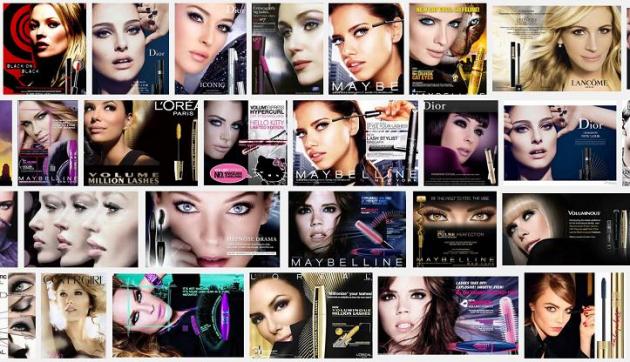Mascara Ads Will Never Stop Lying To You
2013.11.14

We'd hate to break the news to all those ladies who covet super fluffy eyelashes, but these mascara ads which claim to make your lashes "8X Bigger. Smoother. Even." or "200% more volume" are still promoting nothing but false hope.
The National Advertising Division has already brought up this issue plenty of times in the past. They've recently suggested that Proctor & Gamble either stop using false eyelashes/photoshop, or at least include obvious disclaimers in their ads. P&G responded by saying that they appreciated that NAD allowed them to continue using false eyelashes:
...particularly that the cosmetics industry may continue to use lash inserts in mascara advertising featuring performance claims provided their use is disclosed as part of the main message of the advertising. P&G has always been a leader in this area, i.e., disclosing the use of lash inserts, and as a strong supporter of the self-regulatory process, P&G will take NAD's recommendations into account in future advertising.
NAD also had an issue with to L'Oreal's brands of Maybelline Volum' Express the Rocket mascara, stating that the ads were misleading. They noted that while the claims about what the mascara could do were accurate, L'Oreal should still stop using fake lashes or at least make it obvious they were doing so:"To
be clear," NAD's decision stated, "NAD is not suggesting that the
beauty industry take 'beauty' out of cosmetic advertising. … NAD is
simply restating what the law requires – that when you make a
performance claim for mascara and include a photograph depicting a woman
wearing the mascara, the picture should not be enhanced by artificial
means – either digitally or physically."
But L'Oreal insists on leaving the decision up to the National
Advertising Review Board. Rebecca Caruso, the executive vice president of corporate communications for L'Oréal, defended the decision by saying:"Women know that the product's results will differ for reasons such as their own personal features and makeup techniques. They do not expect to look like the model in the ad."
To us, this just sounds like a whole lot of hoopla just to trick people to buying more mascara.[New York Times]
More Articles
Copyright © Fooyoh.com All rights reserved.